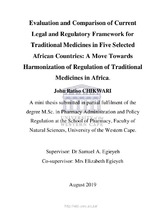Evaluation and comparison of current legal and regulatory framework for traditional medicines in five selected African countries: A move towards harmonization of regulation of traditional medicines in Africa.
Abstract
Background: In Africa, traditional medicine (TM) practice has been in existence since time
immemorial as the major source of pharmacotherapy. However, unlike orthodox medicines
TM policies and regulations are not formalised let alone standardised. African nations have
different approaches and regulatory requirements whereas in some states policies are even
non-existent.
Aim: The aim of the mini thesis was to assess the current policies and guidelines for
regulation of TM in five selected sub-Saharan African countries relative to the WHO
recommendations on traditional medicine policy.
Method: The mini thesis was a desk review of current policy frameworks and guidelines for
regulation of traditional medicines relative to WHO recommendations on TM policy in sub-
Saharan Africa using five selected countries.
Result: The results from the five selected countries showed significant difference in the
current policies and guidelines on the regulation of TM, but no significant difference in the
actual WHO TM policy indicators that the countries implemented.
Discussion: Regularisation of TM practice by integrating it into main health systems could
make it more acceptable. The complexity of TM/herbal products needs a different yet
integrated approach. Harmonisation of regulatory requirements eliminates the need for
redundant testing, ensures consistency across regions and improves implementation of
WHO TM policy indicators.

